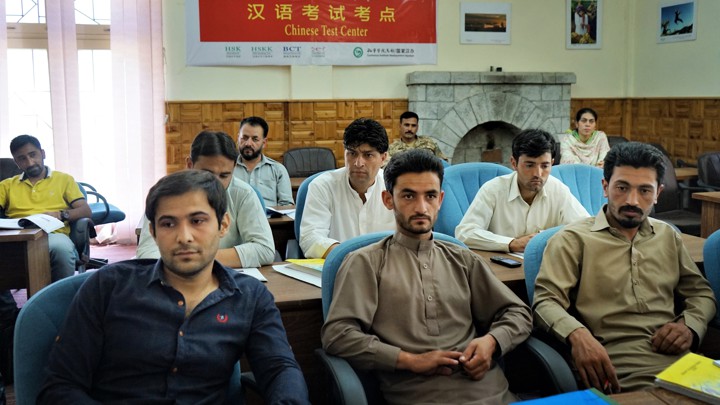Media Report

- The Atlantic reports: "On a July morning, Saqlain Abbas, 26 years old, stood before rows of students, Mandarin textbook in hand, while a Pakistani soldier sat silently at the back of the classroom with a gun at his side. Hanging on the wall was a collection of idyllic Chinese landscapes—the reddish-orange mountains of Gansu, the placid waters of a lake in Xinjiang. Here, at Karakoram International University, in a remote, rugged terrain that is still contested territory between India and Pakistan, the Pakistani military has been sponsoring free Mandarin courses for indigent students.'Previously, students were more inclined toward English,' Muhammad Ilyas, the director for the university's Institute of Professional Development, told me. Today, that's changing, as young Pakistanis increasingly gravitate toward Mandarin in search of jobs and degrees."
- The Wall Street Journal reports: "Investors in the black stuff found themselves with a big black eye Tuesday. U.S. oil prices dropped by more than 7%, the worst one-day fall since 2015 following a bearish report from the Organization of the Petroleum Exporting Countries (OPEC) and more Twitter bluster on oil supply from President Trump. The market's main focus has been on what the report had to say about oil supply, particularly figures that showed rising production in Russia and from other OPEC members more than offsetting cuts from sanction-hit Iran. More worrying is what the report didn't say. In particular, its estimates for demand growth next year from China, the world's second-biggest consumer, are starting to look a little too rosy."
- The New York Times reports: "United Nations human rights officials have sharply condemned regulations issued by China that seek to provide a legal basis for the mass internment of Muslims in the Xinjiang region. Six United Nations officials and rights experts said in a letter sent on Monday to the Chinese government that the regulations were a violation of international law, and they urged that those responsible be held accountable. The regulations were issued by the authorities in Xinjiang in western China, who said they were intended "to contain and eradicate" extremism. The United Nations experts contended that the new rules to justify mass internments in "re-education centers'' were based on overly broad definitions of extremist behavior and amounted to criminalizing the legitimate exercise of basic rights."
Calendar
- 2018-11-13 Xi Expands China’s Footprint in the Pacific While Trump Stays Home
- 2018-11-12 China calls for open world economy but work remains on landmark trade pact
- 2018-11-11 Bilateral ties, military movement key points at US-China meeting
- 2018-11-09 Forget the trade war, China's economy has other big problems
- 2018-11-08 Trump’s Tariffs Have Fully Kicked In—Yet China’s Exports Grow
- 2018-11-07 Here's what the US election results mean for Trump's trade war with China
- 2018-11-06 China open to trade talks with US, says Wang Qishan
- 2018-11-05 Xi tells the world China will boost imports while swiping at Trump’s ‘law of the jungle’
- 2018-11-04 Trump-Xi Trade Deal Is Likely to Begin Rather Than End at G-20
- 2018-11-02 Trump and China’s Xi give positive signs over phone call but markets give up early gains
News
- The New York Times U.N. Rights Officials Criticize China Over Muslim Internments
- The Wall Street Journal China, the U.S. and the Oil Blame Game
- The Atlantic Why Young Pakistanis Are Learning Chinese
- TIME Author Leta Hong Fincher Shows Why the World Should Pay Attention to China's Feminists
- The Wall Street Journal Tencent Posts Higher Profit, but China's Videogame Freeze Clouds Prospects
- Fox News China's Zotye Automobile aiming to enter U.S. market in 2020
- The Wall Street Journal At Summit, China Finds Multiplayer Trade Deals Don't Come Easy
- Reuters China's October property investment growth hits 10-month low as economy slows
- The Wall Street Journal U.S. Panel Warns China Tech Prowess Threatens U.S. Security
- CNBC Trump's tariff battle with China is spurring record dollar-yuan trading
Commentary
- Bloomberg Tencent's WeChat Giant Is Still Quick on Its Feet
- Financial Times American executives are becoming China sceptics
- Politico How the China trade war could get very bad, very fast
- The Washington Post Trump's bilateral approach favors China
- Financial Times China's biggest financial risk is the US
- MarketWatch Opinion: China always promises to stop cheating on trade, but never does
- The Washington Post Pence: It's up to China to avoid a cold war
